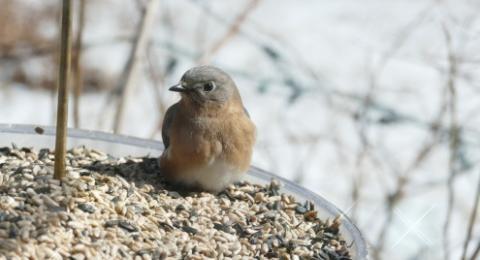Cleaning Your Bird Feeders

Spring is slowly making its way back to us, meaning the birds will be foraging in greener pastures soon (so to speak). Bird feeders that provided them with easy pickings during the winter while providing us with the joy of watching them will soon need to be packed up for the season. Bringing your bird feeders in by April helps to avoid problems with foraging bears, who become more active in the spring hunting for food.
If you have had feeders out for the winter before, you know the importance of keeping them clean. Cleaning bird feeders regularly is essential for preventing pests, mold, and the spread of disease. It is best to clean your feeders once every other week (except for hummingbird feeders, which should be cleaned weekly). Clean your feeders by wiping them down with soap and hot water. You can also fully immerse the bird feeder in a solution of one part bleach and nine parts water for fifteen minutes. Or, you can use one part white vinegar to one part water. When done, rinse and allow to fully dry before putting back up. When cleaning your feeders, wear gloves if possible, and wash your hands after handling the feeders.
Another way to keep your feeders tidier between cleanings is to only fill it with enough food for your local birds to eat in a day. That way there is not food sitting and potentially rotting for longer periods. Regularly clean up the seed hulls and droppings that appear around your feeders to limit help prevent mice and bears from frequenting the area. Hummingbird feeders have standing sugar water in them, so that should be changed every three to five days to prevent mold and fermentation. If the weather is warmer, change the water more often. Clean the feeder once a week in just hot water. Avoid soap or detergent. Suet feeders should be cleaned often, especially in warmer weather, as the suet can go rancid. Suet does better in colder weather.
Whenever your feeders are up, keep an eye out for sickly birds. Birds with crusty eyes, eyes that are swollen or closed may be ill. Other signs are fluffed feathers, slow or uncoordinated movement, or bright green droppings. If you see signs of sick birds, take down your feeder (wearing gloves!), clean it, and leave it down for several days. It is always helpful to have a brush pile nearby to provide shelter for the birds, as predators know to watch feeders too!
If you want to add bird houses to your yard in the spring, check out this Question of the Week from the UNH Extension Education Center
Resources
https://www.youtube.com/watch?v=fS8ya7ejflI Bird Feeder Cleaning from UWyo Extension
https://ny.audubon.org/news/keeping-your-feeder-birds-safe-winter
https://extension.unh.edu/resource/winter-bird-feeding-fact-sheet
Project Feeder Watch from The Cornell Lab
https://feederwatch.org/learn/feeding-birds/?__hstc=75100365.9b9ba973eb…
